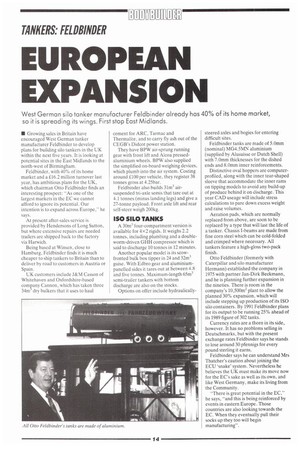EUROPEAN EXPANSION
Page 154

If you've noticed an error in this article please click here to report it so we can fix it.
West German silo tanker manufacturer Feldbinder already has 40% of its home market, so it is spreading its wings. First stop East Midlands.
• Growing sales in Britain have encouraged West German tanker manufacturer Feldbinder to develop plans for building silo tankers in the UK within the next five years. It is looking at potential sites in the East Midlands to the north-west of Birmingham.
Feldbinder, with 40% of its home market and a £16.2 million turnover last year, has ambitious plans for the UK, which chairman Otto Feldbinder finds an interesting prospect: "As one of the largest markets in the EC we cannot afford to ignore its potential. Our intention is to expand across Europe," he says.
At present after-sales service is provided by Hendersons of Long Sutton, but where extensive repairs are needed trailers are shipped back to the factory via Harwich.
Being based at Winsen, close to Hamburg, Feldbinder finds it is much cheaper to ship tankers to Britain than to deliver by road to customers in Austria or Spain.
UK customers include J&M Casson of Whitehaven and Oxfordshire-based company Cannon, which has taken three 34e dry bulkers that it uses to haul cement for ARC, Tarmac and Thermalite, and to carry fly ash out of the CEGB's Didcot power station.
They have BPW air-sprung running gear with front lift and Alcoa pressedaluminium wheels. BPW also supplied the simplified on-board weighing devices, which plumb into the air system. Costing around £100 per vehicle, they register 38 tonnes gross at 4.25bar.
Feldbinder also builds 31m3 airsuspended tri-axle semis that tare out at 4.1 tonnes (minus landing legs) and give a 27-tonne payload. Front axle lift and rear self-steer weigh 200kg.
ISO SILO TANKS
A 30m3 four-compartment version is available for 4x2 rigids. It weighs 2.2 tonnes, including plumbing and a doubleworm-driven GHH compressor which is said to discharge 10 tonnes in 12 minutes.
Another popular model is its scowfronted bulk box tipper in 24 and 32m3 guise. With Edbro gear and aluminiumpanelled sides it tares out at between 4.8 and five tonnes. Maximum-length 65m3 semi-trailer tankers with bottom discharge are also on the stocks.
Options on offer include hydraulically
steered axles and bogies for entering difficult sites.
Feldbinder tanks are made of 5.0mm (nominal) MG4.5MN aluminium (supplied by Alusuisse or Dutch Shell) with 7.0mm thicknesses for the dished ends and 8.0mm inner reinforcements.
Distinctive oval hoppers are computerprofiled, along with the inner tear-shaped sleeve that accommodate the inner rams on tipping models to avoid any build-up of produce behind it on discharge. This year CAD useage will include stress calculations to pare down excess weight and raise volumes.
Aeration pads, which are normally replaced from above, are soon to be replaced by a type that will last the life of a tanker. Chassis 1-beams are made from fine corn steel which can be cold-folded and crimped where necessary. All tankers feature a high-gloss two-pack finish.
Otto Feldbinder (formerly with Caterpillar and silo manufacturer Hermann) established the company in 1975 with partner Jan-Dirk Beckmann, and he is planning further expansion in the nineties. There is room in the company's 10,500m2 plant to allow the planned 30% expansion, which will include stepping up production of its ISO silo containers. By 1991 Feldbinder plans for its output to be running 25% ahead of its 1989 figure of 302 tanks.
Currency rates are a thorn in its side, however. It has no problems selling in Deutschmarks, but with the present exchange rates Feldbinder says he stands to lose around 30 pfennigs for every pound sterling it earns.
Feldbinder says he can understand Mrs Thatcher's caution about joining the ECU 'snake' system. Nevertheless he believes the UK must make its move now for the EC's sake as well as its own, and like West Germany, make its living from the Community.
"There is great potential in the EC," he says, "and this is being reinforced by events in eastern Europe. Those countries are also looking towards the EC. When they eventually pull their socks up they too will begin manufacturing".
















































































































































































